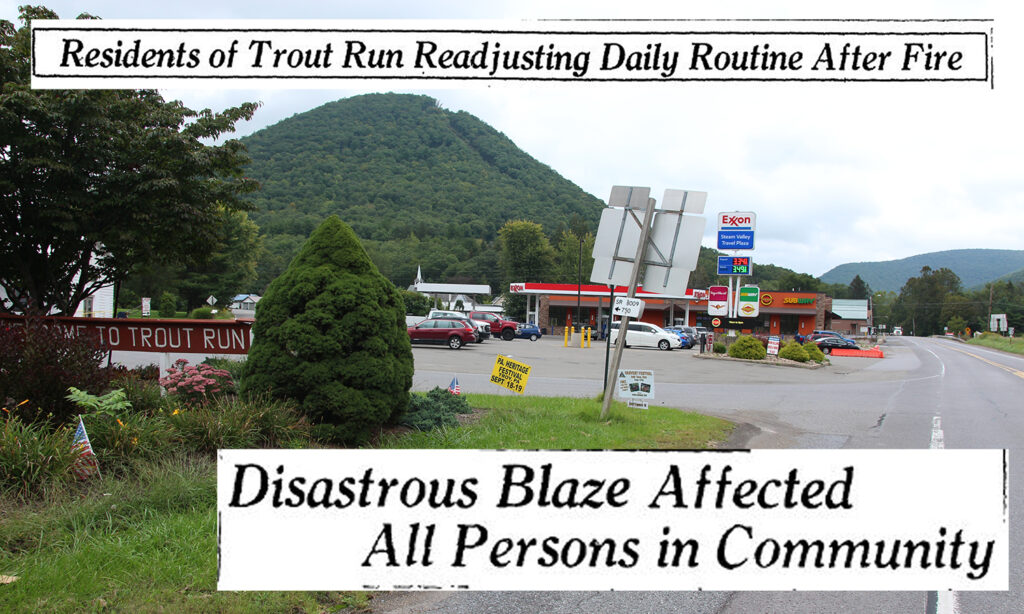
It was Valentine’s Day in 1940 and the small village of Trout Run, 15 miles north of Williamsport, was ablaze.
With over 300 residents, the small burg had no fire trucks or equipment stationed within 10 miles.
To make matters worse, the fire “swept (through) the center of this old-time lumbering town during a snowstorm,” The Public Opinion newspaper, of Chambersburg, said in a Feb. 14, 1940 issue.
The Shamokin News-Dispatch headlined (also on Feb. 14) that this “freak storm” had produced “west and central Pennsylvania’s heaviest snow of the winter, the fall gauging up to 12.4 inches.”
It was in this climate that, according to a writer for the Grit, “the two-hour blaze…threatened to wipe out the entire community” of Trout Run. “(It) affected virtually every resident,” a writer said in the Feb. 18, 1940 edition for The Grit.
Where it started
It was between 8 a.m. and 8:55 a.m. when the fire began “in the boiler room of the 60-year-old Trout Run Hotel, then spread to the nearby general store and post office, and finally leaped to the three-apartment Parker Building, which housed the telephone exchange. The barber shop and several additional apartments were part of the hotel,” a writer for The Grit said.
With over a foot of snow on the ground it was difficult to get assistance.
“There was no fire equipment in the town and most of the 300 to 400 residents formed a bucket brigade in a vain effort to stem the flames,” the Lebanon Daily News said in a Feb. 14, 1940 article.
However, trucks and vehicles from the Loyalsock Volunteer Fire Department were able to arrive on scene and prevented “destruction of even a greater part of town,” said the Grit.
Firefighters from South Williamsport were unable to arrive because “too many men (were) sick for its company to turn out effectively,” the Grit said.
Help is delayed
Williamsport No. 2 Company left about 75 minutes after receiving the first call, but their 15-mile journey was impeded due to the heavy snow.
“The run to Trout Run took three-quarters of an hour because (the) depth of the snow made it impossible for cars and trucks to turn out of ruts. The Company had to trail trucks more than half the way to Trout Run,” the Grit said.
People from Trout Run were not happy and blamed much of the destruction on Williamsport for their delayed response – not because of the snow, but because of the 75 minutes it took to respond to their call.
“Much grumbling could be heard among Trout Run residents as they surveyed the ruins. Many of them, not knowing all the facts, blamed the Williamsport Fire Department for much of the loss,” the Grit said. It added that one “of the principal reasons why Trout Run residents feel bitterly about the help accorded them may be found in a rumor, which has circulated throughout the entire community. According to this rumor, Williamsport firemen demanded a guarantee of $50 before ‘lifting finger to the blaze.’”
Williamsport Councilman Frank Henninger, who served as the public safety director, and other Williamsport firefighters vigorously denied ever making such a request for a guarantee or even mentioning the matter of money.”
But why the long delay? According to the Grit, it was policy for Williamsport firefighters that “permission had to be obtained to send any fire company out of city limits.” Yet, when the call arrived, calls to Henninger were made to his home and his office at City Hall, but he could not be found.
“Constant effort was made to locate Mr. Henninger, and he was finally found in city hall a few minutes after 10a.m.. He had gone from his home to the bank, and then to the market house before reporting at city hall,” the Grit said.
The Grit explained that “In addition to giving permission for No. 2 Company to go to Trout Run, Mr. Henninger also urged firemen, then off duty, to go to the blaze in private cars and offer their assistance.”
The cost of destruction
After the fire was put out, it was estimated that $70,000 (over $1.3 million today) worth of damage had occurred and it left between 30 and 40 people homeless.
It was also explained that ”six families and a number of individuals comprising, all told, about a sixth of the entire population of the town are homeless” and “furniture carried from at least 16 houses that were either burned down or threatened by the blaze is still scattered about in various homes and buildings.”
The Red Cross of Williamsport arrived to assist and many of the residents were able to find lodgings in vacant homes or apartments while the town was rebuilt.
Today, the Williamsport Bureau of Fire confirmed that no permission is needed for company engines to leave city limits and help around the county.




